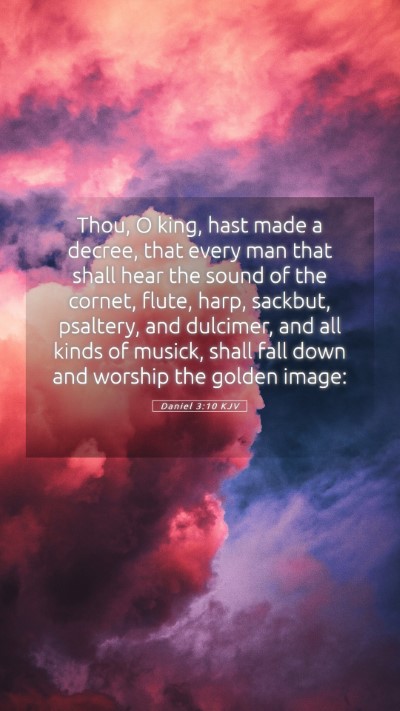Understanding Daniel 3:10
Daniel 3:10 describes a critical moment in history where King Nebuchadnezzar establishes a decree that requires all people to worship the golden image he has set up. This verse reads:
"You, O king, have made a decree, that every man who hears the sound of the horn, flute, harp, lyre, and psaltery, and all kinds of music, shall fall down and worship the golden image." (Daniel 3:10)
Verse Context
This passage is situated in a narrative that emphasizes the challenges faced by Daniel's friends—Shadrach, Meshach, and Abednego—as they uphold their faith in the face of imperial edicts. The king's decree serves as a crucial backdrop, setting the stage for the later miraculous events in the fiery furnace.
Bible Verse Meanings
-
Idolatry and Worship: This verse unambiguously addresses the issue of false worship and the societal pressures to conform. It highlights the conflict between loyalty to God and obedience to human authority.
-
Authority and Command: King Nebuchadnezzar's decree is a potent reminder of the power dynamics in play. It shows how earthly rulers can impose their will, forcing subjects to abandon their beliefs in pursuit of compliance.
-
Divine Fidelity: The text ultimately invites reflection on the necessity of standing firm in faith, even when threatened by the consequences of dissent.
Bible Verse Interpretations
From Matthew Henry's perspective, this verse serves to illustrate the obedience demanded by the king—an obedience that stands in stark contrast to the loyalty owed to God. He suggests that the insistence on worshiping the image embodies the broader theme of idolatry that runs throughout the Scriptures.
Albert Barnes elaborates on the implications of such decrees in a theocratic context, where governing authority intertwines with religious mandates. He notes that this situation creates a dilemma for those faithful to the true God, challenging the believer to assess where ultimate authority lies.
Adam Clarke provides insights into the psychological and social implications of worshiping the golden image. He underscores that such acts compel individuals to prioritize fear of man over the respect and reverence owed to God.
Bible Verse Understanding
To grasp the full significance of Daniel 3:10, one must understand the historical context in which it exists. The Babylonian captivity showcased not only the might of Babylon but also the trial of faith for the Israelites living in exile. The decree served not only as a test for individuals but as a reflection of the broader cultural and religious conflicts of the time.
Applications of Daniel 3:10
The verse invites present-day believers to consider the forms of idolatry that exist today—whether literal idols or modern distractions that draw people away from faith. The challenge remains to prioritize spiritual commitments over societal expectations or pressures.
Bible Study Insights
-
In-depth Analysis: For those engaged in in-depth Bible verse analysis, examining the parallels of faith vs. conformity provides rich material for bible study lessons and conversations within bible study groups.
-
Historical Context: Understanding this narrative also opens discussions on the historical context of the Babylonian Empire, which is crucial for understanding Scripture holistically.
-
Faith Application: How believers today can apply the lessons of standing firm against societal pressures invites meaningful dialogues in bible study resources and supports believers in maintaining their faith.
Related Bible Cross References
- Exodus 20:3-5 - The commandments against idolatry.
- Daniel 3:16-18 - The resolute faith of Shadrach, Meshach, and Abednego.
- Matthew 10:28 - The call to fear not those who kill the body but can’t kill the soul.
Conclusion
Daniel 3:10 is both a historical account and a timeless testament to the struggles of faith amid external pressures. As believers analyze this verse through various lenses—be it idolatry, authority, or personal conviction—they gain a deeper understanding of Scripture that transcends its ancient context and continues to speak to contemporary issues of faith.


